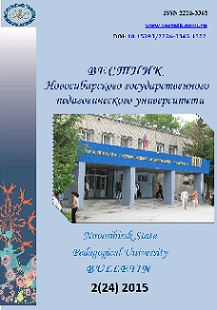ЛАКУНЫ В ЛЕКСИКОГРАФИЧЕСКОМ ОПИСАНИИ СЛОВ ТЕМАТИЧЕСКОЙ ГРУППЫ «ПУНКТУАЦИЯ»
HOLLOWNESS IN THE LEXICOGRAPHICAL DESCRIPTIONS OF THE WORDS OF THE THEMATIC GROUP «PUNCTUATION»
Author(s): Nataliya Petrovna PerfilyevaSubject(s): Language and Literature Studies
Published by: Новосибирский государственный педагогический университет
Keywords: A thematic group of words; a metaphor; an active process; punctuation; lexicography
Summary/Abstract: The article is dedicated to the dynamic processes in modern Russian vocabulary, being under the influence of the phenomenon of written speech, аt least, punctuation. The objective of the article is to consider the modern lexicographical description of the words of the thematic group “punctuation marks” and compare the result and the active processes in the modern Russian linguistic situation. The author considers the use of words like comma, full stop, brackets etc as regular met-aphors (usually cognitive), also adding some examples of using occasional ones. The author argues that a peculiar feature of modern linguistic situation is that ‘punctuation metaphors’ are used not only by creative linguists, working with texts professionally, but also by speakers of оrdinary metalinguistic соnsciousness. A significant part of the article is devoted to examination of dictionary entries concerning punctuation terms in explanatory and synonymic dictionaries. Summing up, the author emphasizes the following conclusions: 1) the thematic group “punctuation” is open and dynamic; 2) modern speakers use the punctuation metaphors widely, further metaphorization is an active process in that thematic field; the phenomenon of written speech, including the image of written text, influences verbal communication and 3) dictionaries mainly interpret the ‘punctuation words’ as monosemantic and terminological; lacunae in their lexicographical descriptions can be explained by rapid changes in modern Russian.
Journal: Вестник Новосибирского государственного педагогического университета
- Issue Year: 2015
- Issue No: 2
- Page Range: 76-84
- Page Count: 9
- Language: Russian

